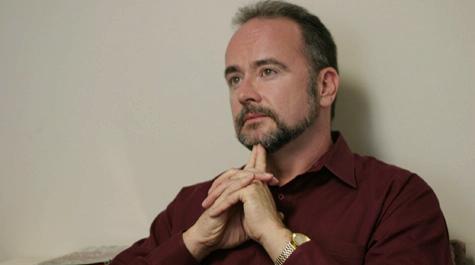After free will: A crisis of human identity?
Paul Davies minced no words about humanity’s pending crisis of identity.
“We don’t know what we are,” he said. “The implications of the discovery of the theory of evolution by natural selection have not been felt, yet.”
Davies, associate professor of philosophy at the College of William and Mary, stopped by the University Relations offices between hosting the department of philosophy’s conference “The Study of the Human Self,” reviewing the proofs of his forthcoming book “Subjects of the World: Darwin’s Rhetoric and the Study of Agency in Nature,” and trying to figure out why he agreed despite his personal inclinations to take his daughter to “Disney.” Binding those three things is his interest in free will.
According to Davies, advances in psychology and neuroscience strongly suggest that the concept of “free will” be abandoned. “In 50 years, it may be historically interesting but practically obsolete,” he said. A goal of his book is to encourage movement toward new conceptual categories about the self that can contribute to the growth of knowledge, not restrict it.
“The book is saying, you’ve got to know the science, and once you know the science, certain traditional philosophical questions are no longer questions,” Davies explained. “I think the problem of free will is a brilliant example.”
Davies summarized his thinking regarding free will: “On the one hand, we all have plenty of experiences that convince us that we have some kind of power. It can be a power to rise above or to resist certain kinds of constraints. It can be the power to overcome temptation. It can just be the feeling of being unfettered when you’re making a choice.”
As scientists have begun to study the mechanisms that result in “felt experiences of rising above constraints or overcoming temptation,” Davies continued, they are discovering that those mechanisms often are not the ones that cause our actions. “Our actions, at least some of them, appear to run on one set of tracks, and the felt experiences of freedom run on a different set. And that calls into question the reliability of the very experiences that convince us that we are free,” he said.
In serving as a principle organizer for the philosophy department’s conference, hosted on Sept. 25 and 26, Davies brought together leading thinkers from the disciplines of philosophy, neuroscience and psychology as a means of opening up dialogue concerning the changing intersection regarding, according to the conference brochure, how we “think of ourselves as deliberators, choosers and actors.” Concerning his consenting to travel to Disney for his daughter’s birthday in November, Davies said, “I don’t like to travel, and I don’t want to be in Disney when it’s wall-to-wall people … . Finally I say to my wife, ‘OK, we’ll go.’ Now, how I got there from trying to imagine the possible outcomes of the different alternatives we could take, I don’t know. I want to say I chose to go, … but we know that how we feel on the inside is not a reflection of the things that cause us to make the decision that we make.”
Asked to consider what a loss of free will would mean for humanity, Davies suggested that the implications are beyond prediction. “We simply don’t know enough,” he said. He did, however, point toward a different way of conceptualizing the self.
“One thing we do know about ourselves is that we are something like generators of meaning,” he said. “Deep in the brain there are certain emotional, or affective, systems, and … they constitute the platform on which all of our conscious capacities are built. … Take our capacity for grief. When we lose someone we love, we can’t control the way we feel. … I think we’ve got plenty of reason to think that is what is really fundamental to us. [Acknowledging] that we don’t have free will isn’t going to shut these things down.”

















